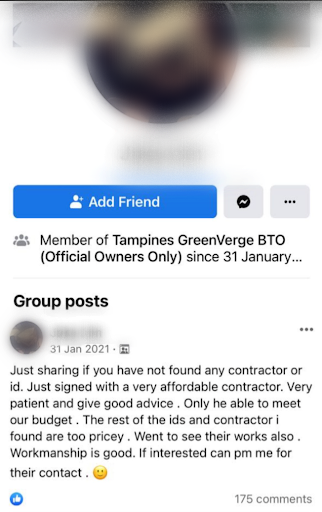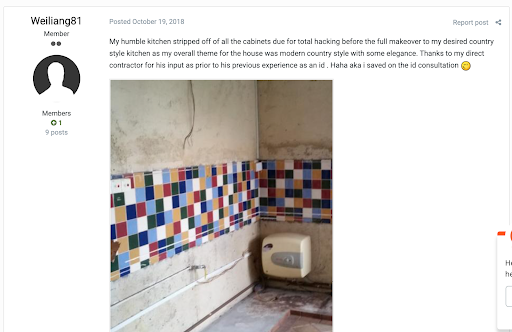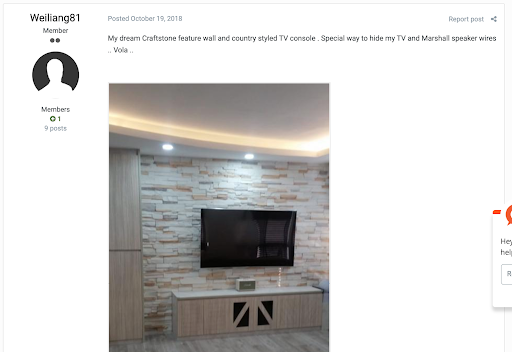Last month, we did a story on a renovation contractor who has allegedly failed to complete renovation work on time (and for one case that we know, failed to start).
The contractor is supposedly named Vincent Liu Junnong, but also goes by many other names. This includes Calvin, Kelvin, Kevin, Mike, Alex and Benjamin Lau, and uses different company names: Sense Construction Werkz, Sense Visual and K & L Interior.
Most of the homeowners have since made police reports and complaints to CASE.
After our initial story came out, the mainstream media such as CNA and Straits Times reported that CASE had issued warning letters to the three companies, urging them to complete the works. The estimated total contract value of the works was S$580,000.
So this time, using the info we have from the victims so far, we’re looking into the modus operandi of this alleged renovation scammer. We’re also highlighting a few tips on what you can do should you encounter one.
Tactic #1: Fake online recommendations
From what we’ve heard from the victims, they got to know Liu and his companies through online recommendations.
After getting the keys to their new Tampines flat, Sya and Ali (not their real names) started searching for a reliable ID online. They came across a very positive review in a BTO project Facebook group about a contractor that offered good workmanship at an affordable rate. Many people had also flooded the comment section to ask for the contractor’s contact details.

So Sya messaged the reviewer for the contact number of the contractor, who was introduced to her as “Alex”.
Besides such a review, other victims have found out about the company through a renovation forum, as mentioned in the first story. LP shared with us previously that he was introduced to “Alex” by his sister-in-law (who’s also a victim). She had found the contact from a renovation forum and found Alex’s quotation to be the cheapest after comparing a few quotes.
Another homeowner, James (not his real name), also came across a positive review on the renovation forum Renotalk, praising the contractor for his price and reliability.

The follow-up posts also included before-and-after photos.


On the other hand, the account of the reviewer was created just a day before posting the review. In addition, we noticed that all the posts of this account were only in this thread, raving about the renovated house.
What to do at this stage?
This is usually when you’re shortlisting the interior designers and contractors you want to engage.
Regardless of the source of the recommendation, whether it’s from a family, friend, Facebook or forum, it pays to do a little bit of digging before engaging them. After all, the renovation will be one of the most significant spendings on your home.
1. Find out if the account giving the recommendation is real
If it’s an online recommendation, search a bit more into the account and see if it’s a real account or if it’s created just to generate leads. As we highlighted earlier, the positive review James found on Renotalk was made just a day before posting. What’s more, the account posts were all in the same thread. These can be red flags that the account might not be genuine.
To be sure, you might want to ask in renovation Facebook groups such as Sg Renovation and Budget Reno if they’ve come across the company.
2. Check if it’s a CaseTrust-accredited company
According to CASE, a CaseTrust-accredited company has to protect the customer’s deposit paid through the purchase of a deposit performance bond. This bond will safeguard the deposit in case of business closures, winding up and/or liquidation.
You can check if the company has a CaseTrust accreditation on this list.
If your home is an HDB flat, you might want to check if the company is on HDB’s list of approved renovation contractors. These companies are required to abide by HDB’s terms so that renovation work is carried out safely.
On top of that, you should also check on the credibility and track record of the company. It’s best to engage one with at least a few years of experience.
3. Read the online reviews
A legit ID or renovation contractor wouldn’t just have a website and social media. You should also be able to find real reviews of it, be it Google reviews or on renovation forums.
Look into these reviews. Are they mostly positive or negative?
If it doesn’t even have a review, it’s a red flag that it may not be a legit company.
Tactic #2: Showflat
From the first meeting Sya had with “Alex”, he gave the impression that he’s an experienced ID. He gave good recommendations on how they should do up their place and even brought the couple to a unit in Tampines that he claimed was a project he’s working on.

This was the same tactic that other homeowners we featured in our first story mentioned. Janessa (not her real name) told us that before paying a deposit, she and her husband were brought by Liu to a unit he was supposedly renovating in Punggol. It looked 80% complete, and the workers seemed to know Liu as they acknowledged him.
It was also what LP had experienced; he was brought to a show flat where Liu was supposedly doing his renovations.
What to do at this stage?
Here’s when it’s good to be more kaypoh. You might want to talk to the workers and subcontractors to find out if it’s a real project and if they have a genuine working relationship with the contractor.
For instance, you can ask them at what stage of the project they’re at, their tasks at hand, etc.
Tactic #3: Pushy schemes to close deals faster
Liu had shared with Janessa and her husband some info about a group buy for air-cons. According to her, he was quite pushy in closing the deal, urging them to get it fast if they’re interested. They eventually agreed and paid a 50% deposit for it. However, they later found out that the money was transferred directly to Liu’s personal PayNow account.
Similarly, LP shared that Liu tried guilt-tripping him and his wife when he sensed that they’re quite reluctant to proceed. This included telling the couple that he had spent a lot of effort and negotiated hard for a good price for them.
According to CASE’s press release, the companies had also requested advance payment to continue the renovation work, even though they haven’t completed the outstanding work according to schedule.
What to do at this stage?
Whether it’s during the first meeting or not, when the ID or contractor gives you a pitch or quotation, don’t say yes straight away. Even if it seems like a good deal, give yourself some buffer time to consider the offer. Don’t rush to sign a contract and make a payment.
Ask for a complete breakdown of processes and items needed in the quotation to compare with other IDs and contractors. And don’t forget to negotiate.
1. Negotiate for a progressive payment schedule
Don’t feel pressured to pay, especially before renovation starts, for instance, to lock in prices before they rise up, or to get the work started earlier. These were what Liu told the victims to push them to pay.
Ideally, negotiate for progressive payments according to the project timeline. So you only make payment when a stage is completed. You might also want to negotiate for the deposit to be as low as possible.
Here’s CASE’s sample agreement that you can follow.
The standard practice is to pay 10% when the agreement is signed, 20 to 30% to commence work, and 40 to 60% for the carpentry.
CASE also recommends that if you find any defects, take photos of them and make sure they’re rectified before making a full payment.
2. Ensure you’re transferring to a business account
These days, it’s very convenient to do a bank transfer. Even if you’re transferring to a business, you can simply use PayNow.
Businesses can now link their company Unique Entity Number (UEN) to their corporate bank account, allowing customers to pay them using PayNow with the UEN or QR code generated.
So if the ID or contractor asks you to pay using PayNow, be sure to ask for the company UEN for the payment.
This helps to ensure that you’re paying to their corporate account, and not their personal account, which was what happened to the victims. It was only after making the payment that they realised they had paid into a personal account.
Tactic #4: Excuses for the delay
According to the victims, they’re given lots of excuses for the delay in completing the renovation. This includes manpower shortage and the workers testing positive for Covid.
What to do at this stage?
Follow up with the contractor continuously. You may also want to try getting the contacts of the workers and subcontractors to liaise directly with them to speed up the work.
But if you suspect that it’s a renovation scam, you should file a complaint to CASE and make a police report.
Also, don’t give the contractor access to your house anymore. Change the padlock so that they can no longer enter your house and do any more work.
Are you a victim of a renovation scam? Share with us your experience in the comments section below or on our Facebook post.
If you found this article helpful, 99.co recommends 5 savvy ways to save on resale flat renovations and Property agent busts rental scam on viral TikTok video.
Looking for a property? Find the home of your dreams today on Singapore’s fastest-growing property portal 99.co! If you would like to estimate the potential value of your property, check out 99.co’s Property Value Tool for free. Also, don’t forget to join our Facebook community page or Telegram chat group! Meanwhile, if you have an interesting property-related story to share with us, drop us a message here — and we’ll review it and get back to you.
The post A deep dive into the modus operandi of a renovation contractor scammer + how to deal with one appeared first on 99.co.

